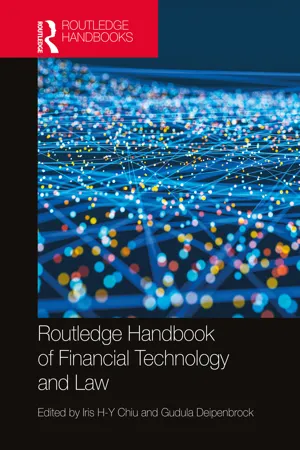
Routledge Handbook of Financial Technology and Law
- 468 pages
- English
- ePUB (mobile friendly)
- Available on iOS & Android
Routledge Handbook of Financial Technology and Law
About this book
Financial technology is rapidly changing and shaping financial services and markets. These changes are considered making the future of finance a digital one.This Handbook analyses developments in the financial services, products and markets that are being reshaped by technologically driven changes with a view to their policy, regulatory, supervisory and other legal implications. The Handbook aims to illustrate the crucial role the law has to play in tackling the revolutionary developments in the financial sector by offering a framework of legally enforceable principles and values in which such innovations might take place without threatening the acquis of financial markets law and more generally the rule of law and basic human rights.
With contributions from international leading experts, topics will include:
- Policy, High-level Principles, Trends and Perspectives
- Fintech and Lending
- Fintech and Payment Services
- Fintech, Investment and Insurance Services
- Fintech, Financial Inclusion and Sustainable Finance
- Cryptocurrencies and Cryptoassets
- Markets and Trading
- Regtech and Suptech
This Handbook will be of great relevance for practitioners and students alike, and a first reference point for academics researching in the fields of banking and financial markets law.
Frequently asked questions
- Essential is ideal for learners and professionals who enjoy exploring a wide range of subjects. Access the Essential Library with 800,000+ trusted titles and best-sellers across business, personal growth, and the humanities. Includes unlimited reading time and Standard Read Aloud voice.
- Complete: Perfect for advanced learners and researchers needing full, unrestricted access. Unlock 1.4M+ books across hundreds of subjects, including academic and specialized titles. The Complete Plan also includes advanced features like Premium Read Aloud and Research Assistant.
Please note we cannot support devices running on iOS 13 and Android 7 or earlier. Learn more about using the app.
Information
Part I
Policy, high-level principles, trends and perspectives
1 Artificial intelligence and machine learning in the financial sector
1 Introduction
Table of contents
- Cover
- Half Title
- Title Page
- Copyright Page
- Contents
- List of illustrations
- Acknowledgements
- Introduction
- List of contributors
- PART I Policy, high-level principles, trends and perspectives
- PART II Fintech and lending
- PART III Fintech and payment services
- PART IV Fintech, investment and insurance services
- PART V Fintech, financial inclusion and sustainable finance
- PART VI Cryptocurrencies and cryptoassets
- PART VII Markets and trading
- PART VIII Regtech and Suptech
- Index